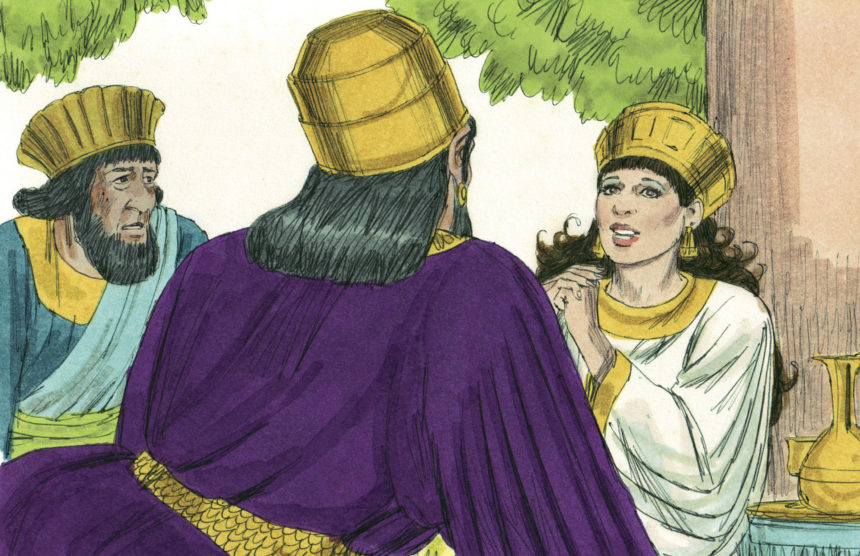Bible Study
Esther Chapters 3 – 4:14 (NLT)
Although it is ancillary to the message of Esther, it should be noted that there is great wisdom in examining our own prejudices and failings. Apart from some nationalistic pride which he actively discourages in his young niece, does Mordecai have any reason to show disrespect to Haman? There’s very little evidence that Mordecai was a devout Jew or actively celebrated Judaism except as a way to excuse his behavior toward a palace official. Conversely does Haman have any reason for his intense hatred of Mordecai and his obsessive desire to not only kill him, but all Jewish people? Surely Haman would have recognized that most people who bowed to him were doing so not out of any genuine respect, but because of some cultural expectation and hoping to garner favor themselves. It is sobering to think how many of our actions and attitudes arise not from God’s word or some Holy inclination, but out of learned bias.
Regardless of how or why their feud began, the actions of Mordecai and Haman go very quickly from a personal scuffle to involving the fate of all the Jewish people. Haman manages to convince King Xerxes to issue a decree which demands the annihilation of all Jews throughout the empire and encourages this slaughter by promising the property of the murdered people to their killers. The impact of such an expectedly harsh and capricious proclamation was that the whole city falls into chaos (3:15). Upon hearing the news, Mordecai displays all the signs of intense mourning – tearing his clothing, covering himself in ashes, and wailing loudly. And although, it is hard to catch, God shows up. “In 4:9 an acrostic of a name of God occurs in reverse sequence in the first letters of four words. In transliteration, these words are ẖtk w̱ygd ḻ’str ‘ṯ, ‘Hathach . . . reported to Esther [what].’ Reading the underlined letters in reverse sequence, one finds ‘lwh, or with vowels, ‘eloah.”[1] (Asbury Bible Commentary) True, God is not specifically mentioned in the book of Esther, but the author found a sly way to remind the readers of this book that God is still there. We can find Him not only in the carefully chosen language of Esther (similar acrostics occur in 5:4, 7:5, and 7:7), but God has also been moving through the background. Although we might not always recognize God’s presence it’s important to note that we believe in an omnipresent God who is always there. Here at the darkest hour for Mordecai and Esther, God is already working out the deliverance for his people.
Mordecai makes it clear that Esther may have a part to play in God’s scheme to liberate his people: “Who knows if perhaps you were made queen for such a time as this” (4:14). In fact, God has already been working. It is an interesting reversal. How easy would it be for Esther to think of her position as a liability rather than a gift? She reasons, “Anyone who appears before the king in his inner court without being invited is doomed to die” (4:11). At this point, she is probably thankful to be Esther with the unknown nationality and the pretty Persian name – rather than Hadassah, the Jewish girl who finds herself in a surprising position of prominence. When we feel threatened or put on the spot, it can be easy to forget that where we are in life is not an accident. God is not unaware of our position and He is prepared to use us in that very place, even if we find ourselves in a frightening place like Esther. Paul makes a similar assertion in 1Corinthians 7:7 where he describes his being unmarried as a “gift.” Few Jewish men of Paul’s day would describe being single as a gift, but Paul recognizes that God places us where he needs us for a reason.
Sometimes when we are confronted with a challenge – especially a challenge that involves our speaking out about some injustice or some wrong, we are tempted to curse the position in which we find ourselves. Maybe God manipulated the universe to gift us to that place for that time. Who knows? Perhaps you got that job for such a time as this? Or found yourself in that supermarket for such a time as this? Or as that homeroom parent for such a time as this? When was the last time, we honestly thanked God for putting us in the position of influence or for giving us a voice to speak out? Even more than that, perhaps now is the time that we need to accept that gift and use it for God’s glory.
Questions:
- Describe where you are in life: age, location, vocation, relationships, etc. Does this position include any learned bias? How much of where you are do you consider a blessing? A Curse?
- What injustice or change in the world might God be calling you to?
- How might God be positioning you to address injustice or introduce change?
[1] Livingston, Herbert G. The Asbury Bible Commentary, “Esther.” https://www.biblegateway.com/resources/asbury-bible-commentary/Hamans-Rise-Fall

